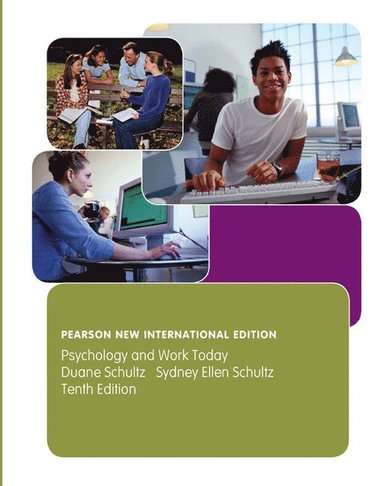
- Format
- Häftad (Paperback)
- Språk
- Engelska
- Antal sidor
- 440
- Utgivningsdatum
- 2013-07-23
- Upplaga
- 10
- Förlag
- Pearson
- Medarbetare
- Schultz, Sydney Ellen
- Illustratör/Fotograf
- Illustrations
- Illustrationer
- Illustrationsstrations
- Dimensioner
- 275 x 215 x 15 mm
- Vikt
- Antal komponenter
- 1
- Komponenter
- 12:B&W 8.5 x 11 in or 280 x 216 mm Perfect Bound on White w/Gloss Lam
- ISBN
- 9781292021683
- 1610 g
Psychology and Work Today: Pearson New International Edition
International Student Edition
Kundrecensioner
Fler böcker av Duane Schultz
-
History of Modern Psychology
Duane Schultz
-
Psychology and Work Today
Duane Schultz
-
Most Glorious Fourth
Duane Schultz, Duane P Schultz
-
Custer
Duane Schultz
Övrig information
Duane P. Schultz is Emeritus Professor at University of South Florida, USA.
Innehållsförteckning
Brief TOC:
I. THE PRACTICE OF INDUSTRIAL-ORGANIZATIONAL PSYCHOLOGY.
1. Principles, Practices, and Problems.
2. Techniques, Tools, and Tactics.
II. THE DEVELOPMENT OF HUMAN RESOURCES.
3. Employee Selection Principles and Techniques.
4. Psychological Testing.
5. Performance Appraisal.
6. Training and Development.
III. ORGANIZATIONAL PSYCHOLOGY.
7. Leadership.
8. Motivation, Job Satisfaction, and Job Involvement.
9. The Organization of the Organization.
IV. CHARACTERISTICS OF THE WORKPLACE.
10. Working Conditions.
11. Safety, Violence, and Health in the Workplace.
12. Stress in the Workplace.
V. ENGINEERING PSYCHOLOGY.
13. Engineering Psychology.
VI. CONSUMER PSYCHOLOGY.
14. Consumer Psychology.
References.
Glossary.
Photo Credits.
Index.
____________________________________________________________
Schultz & Schultz: PSYCHOLOGY AND WORK TODAY, 10TH EDITION
CONTENTS
PREFACE
PART ONE: The Practice of Industrial-Organizational Psychology
Chapter 1: Principles, Practices, and Problems
Would You Work If You Didnt Have To?
Newsbreak
I-O Psychology on the Job
I-O Psychology in Everyday Life
Newsbreak
What I-O Psychology Means to Your Employer
An Overview of the Development of I-O Psychology
Pioneers in Personnel Selection
World War I and the Testing Movement
The Hawthorne Studies and Motivational Issues
Newsbreak
World War II and Engineering Psychology
Later Developments in I-O Psychology
Challenges for I-O Psychology
The Virtual Workplace
Virtual Employees
Newsbreak
Worker Involvement
New Technology Requires New Skills
The Global Workplace
Newsbreak
Ethnic Diversity in the Workplace
Different Generations? Different Values
Newsbreak
Careers in I-O Psychology
Newsbreak
Practical Problems for I-O Psychologists
Fraudulent Practitioners
Credentials and Certification
Communicating with Management
Worker Resistance to New Ideas
Research or Application?
Areas of I-O Psychology
Summary
Key Terms
Review Questions
Additional Reading
Chapter 2: Techniques, Tools, and Tactics
Why Study Psycho...
Du kanske gillar
-
Let Them Theory
Mel Robbins
InbundenFrågor & svarAtomic Habits
James Clear
Trade paperback (UK)Next Conversation
Jefferson Fisher
Trade paperback (UK)
